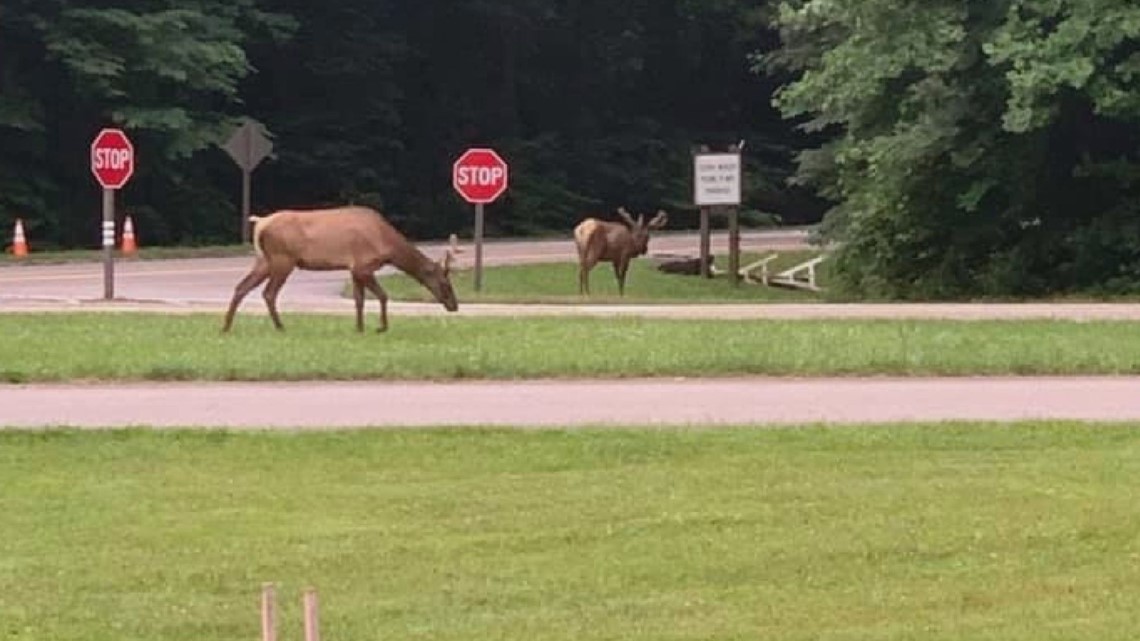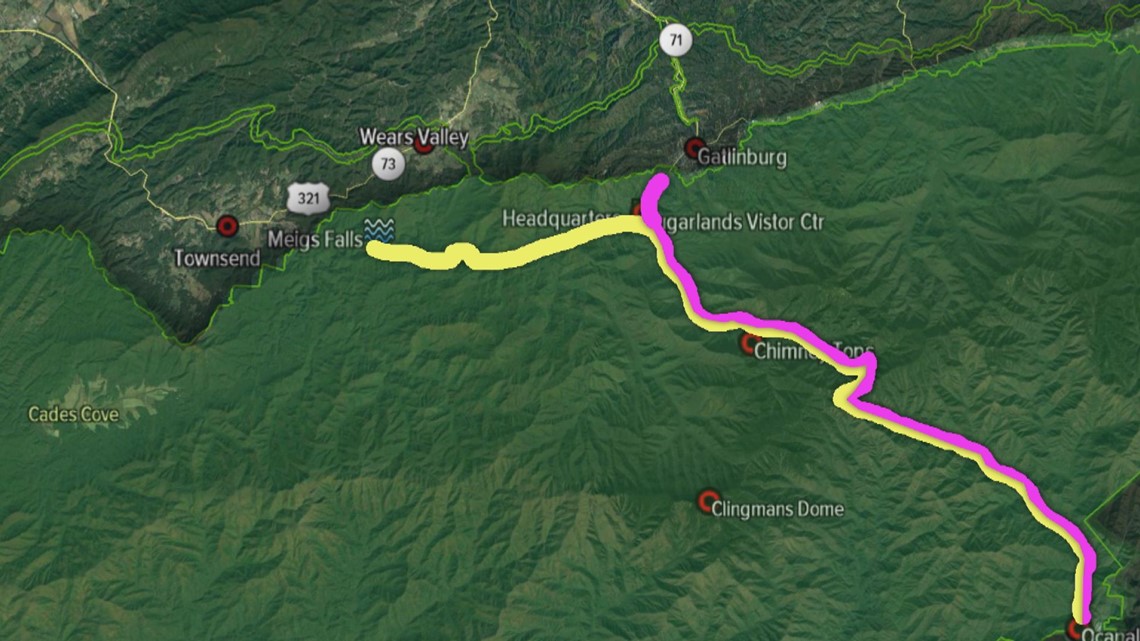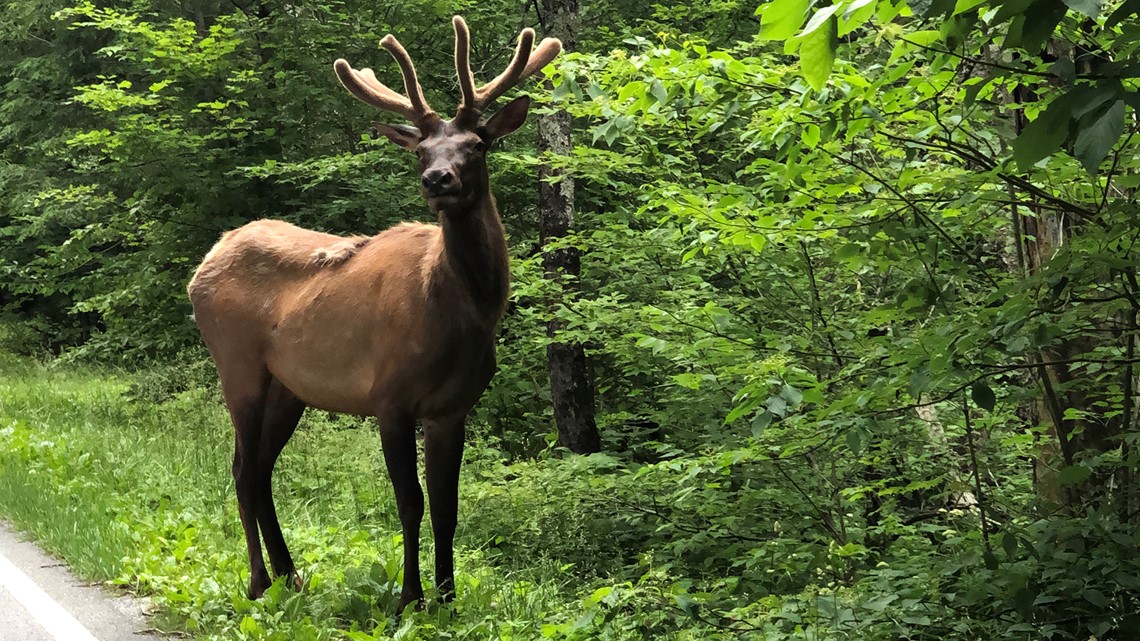GATLINBURG, Tenn. — Update, Saturday, June 22, 2019, 11:30 a.m: Photos shared with WBIR 10News show the male that was at Meigs Falls on Thursday made its way late-Friday to the Townsend area along Wears Valley Road. Please be safe when driving through these areas.
Original report below posted Thursday, June 20, 2019 at 8:35 p.m.
This week visitors in the Smokies have seen something that's never happened before. Two elk from North Carolina made their way to park headquarters near Gatlinburg on the Tennessee side of the Great Smoky Mountains, and they've kept going.
"This was the first time we've had elk on the park headquarters lawn. They were enjoying the freshly cut grass on Wednesday, and now they have split up," said Dana Soehn, spokesperson for the Great Smoky Mountains National Park (GSMNP).
Both elk were together Wednesday at Sugarlands Visitor Center and park headquarters. The latest sightings Thursday afternoon placed one elk about a mile away from headquarters toward the Gatlinburg entrance to the park. The other young bull hoofed it 13 miles west to the area near Meigs Falls.


Neither animal is currently being tracked by a GPS collar or other devices.
Biologists brought some extra signs from park facilities in North Carolina to warn visitors in Tennessee of the dangers of approaching elk. The National Park Service reintroduced elk to the Cataloochee area in North Carolina in 2001.
"In North Carolina, we have good signage there reminding people about the danger of getting too close to Elk. They have been watching elk in North Carolina for 15 years. The elk started in Cataloochee and then established a herd in Oconaluftee. We haven't had these signs on the Tennessee side of the park, so this is new," said Soehn.


To be clear, elk are not new to Tennessee. They were reintroduced in other areas of the state by the Tennessee Wildlife Resources Agency (TWRA). In the national park, young males from the herd in Cataloochee have roamed into the Cosby area of the Smokies in Tennessee via the Interstate 40 corridor.
What makes the current trek unique is the animals' chosen route. They are following and expanding upon a path first taken in 2018 when three young bulls from North Carolina climbed the highest peak in the Smokies at Clingmans Dome and crossed into Tennessee along Newfound Gap Road.
The animals in 2018 stopped at the Chimney Tops picnic area before returning to North Carolina. This year, the two animals have kept blazing and grazing a path even farther from the home herd.


"They don't seem to be disturbed by road noise or traffic, so we're reminding people to be aware and slow down," said Soehn.
Park biologists have tried to scare the elk away from the main road into areas where they can safely graze deeper in the woods or in open areas.
'"If you see the elk present in an open area or field, that field is closed. People aren't really prepared for how to safely view the elk here [in Tennessee], so we're reminding them of that 50-yard rule. Stay 50 yards away from the elk to keep yourself save and you're allowing that elk to be wild."


It is difficult for many people to judge a distance of 50 yards. The National Parks Conservation Association (NPCA) said a general rule of thumb is 15 car lengths. If you stop to take pictures in a roadside traffic jam, keep 15 cars between you and the elk.
Like 2018, these young bulls will likely retrace their route and return to the herd in North Carolina during mating season. There are currently no female elk on the Tennessee side of the Smokies.
Soehn said if the elk continue to repeat the annual trip from North Carolina to Tennessee via Newfound Gap Road, it increases the likelihood that the herd will permanently expand into Tennessee along the same route.
See the embedded YouTube video from the Great Smoky Mountains Association for more tips on safely viewing elk.

